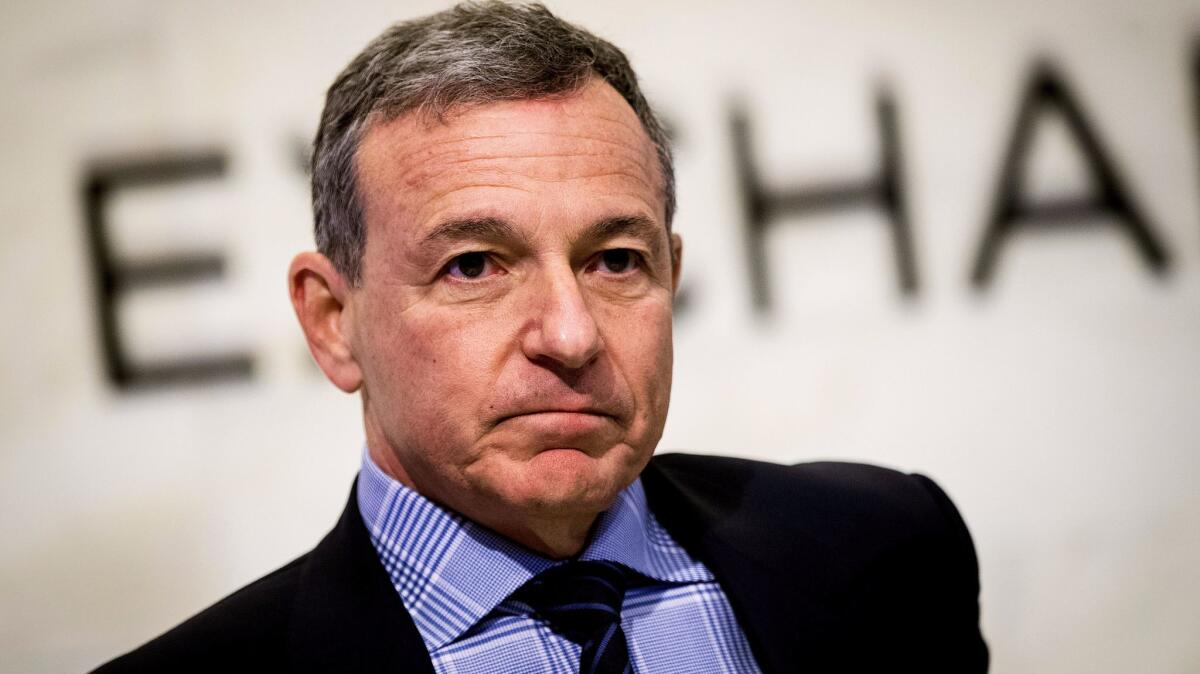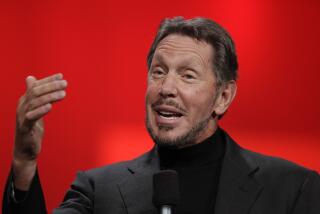Disney buys much of Rupert Murdoch’s 21st Century Fox in deal that will reshape Hollywood

The bold bet by Disney will transform Hollywood, but how the two companies will merge is a big question.
Walt Disney Co. has finalized a $52.4-billion deal to buy much of Rupert Murdoch’s entertainment empire, a blockbuster union that would radically transform Hollywood into a land of fewer giants.
The stock deal, which Disney announced Thursday morning, represents Disney’s boldest acquisition yet. If regulators approve it, the Burbank behemoth would take over the prolific 20th Century Fox movie and television studio, Fox’s 22 regional sports channels, cable entertainment brands FX and National Geographic, and Fox’s portfolio of international operations, including a fast-growing pay-TV service in India.
The proposed purchase of much of Murdoch’s 21 Century Fox media company accelerates the trend of media consolidation and would eliminate one of the six major Hollywood film studios. Murdoch would retain control of Fox News Channel, the Fox broadcast network and his newspapers.
Disney would also assume about $14 billion in debt, resulting in a total deal value of about $66 billion. Following the transaction, Fox shareholders would make up about 25% of the bulked-up Disney.
Disney also announced Thursday that its chairman and chief executive, Bob Iger, will remain with the company through 2021.
“We’re honored and grateful that Rupert Murdoch has entrusted us with the future of businesses he spent a lifetime building, and we’re excited about this extraordinary opportunity to significantly increase our portfolio of well-loved franchises and branded content to greatly enhance our growing direct-to-consumer offerings,” Iger said in a statement.
“The deal will also substantially expand our international reach, allowing us to offer world-class storytelling and innovative distribution platforms to more consumers in key markets around the world,” Iger said.
The deal probably won’t close until sometime in 2019, according to Disney, because the company has to secure approvals from regulators in Washington and in other countries. However, once the transaction is complete, Rupert Murdoch and his family will become the second-largest shareholders in Disney, with an approximately 4.4% stake.
Disney’s determination to marshal resources is the clearest signal of heightening tensions between technology giants and legacy media. After decades of dominance, Disney, Time Warner, Fox, CBS and NBCUniversal have been scrambling to bulk up to withstand the gale forces coming from Google, Facebook, Netflix, Apple and Amazon.com, which have pushed into television production and distribution.
Audiences for traditional television have been shrinking, in part because viewers have so many options, including big-budget shows available through Netflix and Amazon. Movie attendance has stagnated. And Netflix is stepping up its output of films, roiling that business along with television.
“This acquisition reflects a changing media landscape,” Iger told analysts Thursday. He cited the demands of “today’s empowered consumers” for content and their desire to consume media on multiple platforms.
Disney plans to launch its own streaming service in 2019 to compete directly with Netflix. This deal gives it a new source of content to feed that service.
Adding Fox’s pipeline to Disney’s arsenal “will allow us to greater accelerate our direct-to-consumer strategy,” Iger said. “It’s a very important move forward.”

The sale of Fox assets marks a downsizing by Murdoch, who has spent the last 50 years building a media powerhouse from a small newspaper in Australia. But the 86-year-old media baron recognized that Fox’s movie and cable TV operations face an increasingly uncertain future, according to people close to him. And the deal with Disney enables the mogul and his family to become one of the largest shareholders in Disney, a bigger and more valuable media company.
“With today’s announcement, we launch the next great leg of our journey,” Murdoch said on a Fox call with analysts Thursday morning. “The world of media has obviously been undergoing rapid change. New technologies, competitors and shifting consumer preferences have redrawn the whole media map.”
“Are we retreating? Absolutely not,” Murdoch said. “We are pivoting at a pivotal moment.”
His son, Lachlan Murdoch, who serves as co-chairman of 21st Century Fox, agreed that the company was not in retreat.
“The new Fox is about returning to our roots as a lean, aggressive challenger brand,” he said.
In a report last week, Berstein & Co. media analyst Todd Juenger wrote: “Maybe the Murdochs have looked at the future and realized their business is a declining asset, worth more today than it ever will be in the future.”
Murdoch is not selling out completely. He is holding on to certain properties, including Fox News, the Fox broadcast network, television stations and the cable channels Fox Sports 1 and Fox Sports 2. His newspapers — such as the Wall Street Journal, New York Post, Times of London and a portfolio of Australian properties — are housed in a second company, News Corp., that the Murdoch family controls with 39% of the voting shares. Some analysts expect Murdoch to eventually fold the remaining Fox assets into News Corp.
Under the terms of the agreement, shareholders of Murdoch’s 21st Century Fox media company will receive 0.2745 of a Disney share for each 21st Century Fox share they hold. To accomplish the deal, Fox must first spin off the assets it plans to retain, including Fox News, the Fox broadcast network, Fox Sports 1 and Fox Sports 2 and the Big Ten network.
Winning regulatory approvals is not a sure thing. Because of that uncertainty, Disney agreed to pay 21st Century Fox a massive $2.5-billion breakup fee if Disney fails to secure the required approvals.
Buying Fox would continue the transformation of Disney, which began when Iger took the helm in 2005. He engineered a series of savvy acquisitions, starting with the 2006 purchase of Pixar Animation Studios — creator of “Toy Story,” and “Finding Nemo” — which reinvigorated Disney’s moribund animation division. The company then bought Marvel Entertainment in 2009 and Lucasfilm in 2012, betting big on marquee film brands such as “Star Wars.”
Then came a shift. This year, Disney spent $1.6 billion to gain a majority stake in BamTech, an online streaming platform that Disney plans to use to launch two streaming services in the next two years, including an ESPN service next year. Disney decided its future was in selling its shows and sports channels directly to consumers.
“The core underlying driver for this deal … is the impending battle royale for content and streaming services vs. the Netflix machine,” Daniel Ives, head of technology research for GBH Insights, said in a recent report. The “appetite for content among media companies [is] reaching a feverish pitch.”
A Disney-branded streaming service will have more firepower with Fox’s assets. Disney would gain 22 regional Fox Sports networks, which could help entice more sports fans to sign up for the proposed ESPN streaming services if the service eventually includes access to Los Angeles Kings, San Diego Padres and New York Yankees games.
Disney would take over the operations of FX, which has been one of the industry’s most consistent hit-makers, and the 20th Century Fox Television studio, which is much stronger than ABC Studios.
In addition, thousands of old movies and television titles owned by Fox could be used to stock Disney’s streaming service.
“They need a lot more than the occasional movie and a collection of kids’ library to support a subscription service,” Juenger wrote.
Fox’s library would help solve that problem. Fox owns such movies as “Avatar,” “Deadpool” and “X-Men.” Fox’s TV studio produces such hits as “The Simpsons,” “Family Guy,” and “This Is Us.” There’s also a treasure trove of beloved classics, including “The Mary Tyler Moore Show,” “M*A*S*H,” “The Wonder Years” and such movies as “Wall Street,” “Home Alone” and “The Sound of Music.”
“The marriage of these assets creates a much more formidable Disney on both the content and streaming front for the coming years,” Ives said.
It is unclear whether James Murdoch, chief executive of 21st Century Fox and the ambitious youngest son of the Australian-born mogul, eventually will land a leadership role at Disney. He has become the odd man out in a power-sharing arrangement with his father and older brother, Lachlan, who has become much closer to Rupert Murdoch.
During an early morning call with analysts Thursday, Disney’s Iger seemed open to the possibility that James Murdoch could become a key player in Burbank.
“James and I have had a lot of conversations about the future of these companies,” Iger said when asked about the younger Murdoch. “He’s been great throughout this process. He will be integral in helping us integrate these companies over the next months and, during that time, he and I will continue to discuss whether there is a role for him here or not.”
News of Disney’s interest in the Fox assets leaked Nov. 6. With Fox hanging out the for-sale sign, other suitors — Philadelphia cable company Comcast Corp., telecom giant Verizon Communications and Sony Pictures Entertainment, a division of the Japanese electronics giant — lined up to express interest. But Fox was most interested in doing a deal with Disney.
Disney’s market capitalization is more than $155 billion. Fox is worth $62 billion.
A sale would represent the end of an era. Murdoch has been a prominent figure in Hollywood since 1985, when he bought a half-interest in the 20th Century Fox film studio from oil magnate Marvin Davis in a $250-million deal. That injected new life into the studio. Later that same year, he claimed the remaining stake for $325 million, became an American citizen and began gobbling up television stations to launch the Fox broadcast network — the nation’s fourth major network — in 1986. Fox News Channel was born in October 1996.
Wall Street isn’t sure whether the U.S. Justice Department would bless the combination. It would reduce Hollywood’s television and movie production capacity by eliminating one of the major studios.
The Justice Department’s antitrust division is suing to block AT&T’s proposed $85-billion takeover of Time Warner, which includes HBO, CNN, TBS, Cartoon Network and the Warner Bros. film and TV studio.
However, the elder Murdoch is a powerful friend of President Trump, whose administration would oversee the regulatory review in the U.S.
Times staff writers Ryan Faughnder and James Rufus Koren contributed to this report.
ALSO
Disney extends CEO Bob Iger’s contract through 2021
Here’s what Disney is acquiring in its blockbuster deal with 21st Century Fox
Disney’s deal to buy Fox studio could bring substantial layoffs, analysts say
Disney has a wholesome, family-friendly image. Will acquiring Fox create a culture clash?
UPDATES:
8:50 a.m.: This article was updated with information about the Murdochs’ stake in Disney once the deal closes.
6:50 a.m.: This article was updated with comments from Rupert and Lachlan Murdoch.
6:20 a.m.: This article was updated with comments from Bob Iger’s call with investors.
5:45 a.m.: This article was updated with additional details about the deal and comments on James Murdoch.
This article was originally published at 4:05 a.m.
More to Read
Inside the business of entertainment
The Wide Shot brings you news, analysis and insights on everything from streaming wars to production — and what it all means for the future.
You may occasionally receive promotional content from the Los Angeles Times.











